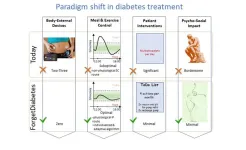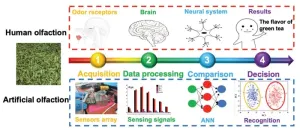(Press-News.org) Programme of combined one-to-one and group support sessions was tested in landmark clinical trial
After one year, one in five people were able to stop taking opioids without their pain increasing
Experts say the new treatment is an alternative to opioid use and has potential to give patients better quality of life
Researchers at the University of Warwick and The James Cook University Hospital, Middlesbrough have led a clinical trial, funded by the National Institute for Health and Care Research (NIHR), on a new treatment which can help people stop needing to use opioid painkillers to manage chronic pain.
There are over 1 million people in the UK on prescription opioids*, over 50,000 of whom have been taking these for 6 months or more*, at an estimated cost of £500 million to the NHS annually.
Recent NHS initiatives have managed to reduce opioid prescribing by eight per cent, saving an estimated 350 lives.
New research has found evidence that could help many more people stop their opioid painkiller use.
Despite the evidence that taking opioids long term is harmful there are currently no alternative treatments available to safely help people who are coming off opioids and still dealing with chronic, non-cancer pain.
A team of researchers and clinicians have developed and successfully trialled an intervention programme designed to guide people in coming off prescription painkillers, taper their opioid intake and learn how to manage their pain using alternative techniques with a course which combines one-to-one and group support.
1 in 5 people came off opioids within one year
The study, titled I-WOTCH (Improving the Wellbeing of people with Opioid Treated Chronic Pain), found that the intervention programme helped 1 in 5 people come off their opioids within one year, without substituting medication and without making their pain worse.
Over 600 people took part in the randomised controlled study between 2017 and 2020 who at the beginning of the trial had been regularly taking strong opioids for at least three months. The participants were recruited from GP practices from the North East of England and the Midlands.
The study compared two treatments, dividing participants randomly into two groups. One group had access to their existing GP care, plus a self-help booklet and relaxation CD; the second group had the same and also took part in an intervention programme specially developed by the study team.
The intervention programme included sessions on coping techniques, stress management, goal setting, mindfulness, posture and movement advice, how to manage any withdrawal symptoms and pain control after opioids.
Participants completed questionnaires about their everyday functioning and painkiller intake at intervals throughout the trial.
After one year, 29 per cent of people who took part in the intervention programme, were able to fully come off their opioids completely, compared to just 7 per cent who were treated with existing GP care, the self-help booklet and CD.
There was no difference between the two groups in terms of their pain, or how pain interfered with their lives.
Combined group and one-to-one support key to reduce opioid need
Harbinder Kaur Sandhu, Professor of Health Psychology at the University of Warwick, who led the clinical trial said: “Structured, group-based, psycho-educational self-management interventions help people to better manage their daily lives with a long-term condition, including persistent pain, but few of these have specifically targeted patients considering opioid withdrawal.
“The findings from the trial are extremely promising. Many people who have been taking prescription painkillers over a long period time suffer with harmful side effects but can feel reluctant to come off them because they think it could make their pain worse, or they do not know how to approach this with their clinician.
“Our trial has found a treatment that could help people to come off opioids, in a way that is safe, supportive and gradual. It’s a supported decision between the patient and the clinician, and not forced tapering. The programme helps people to learn alternative ways to manage their pain and help overcome challenges of withdrawal and has the potential to give people an overall better quality of life.”
Opioids have little long-term impact on chronic pain
Professor Sam Eldabe, clinical trial co-lead and consultant in pain medicine at The James Cook University Hospital, said: “Our trial is the culmination of six years of work during which we learned that the harms from long term opioids extend beyond the individual into their social circle. Patients taking opioids lose interest in social interaction with family and friends and gradually withdraw from society into an opioid-induced mental fog.
“Despite appreciating the social impact of the drugs, most patients utterly dread a worsening of their pain should they attempt to reduce their opioids.
“Our study shows clearly that opioids can be gradually reduced and stopped within no actual worsening of the pain. This confirms our suspicions that opioids have very little long-term impact on persistent pain.”
Colin’s story
Colin Tysall, 81 from Coventry, was prescribed painkillers, including opioids to treat chronic back pain, as a result of working as an aircraft radiologist for 30 years.
“I was an industrial radiologist and wore my back out x-raying aircraft parts and handling heavy castings for jet engines. The castings could weigh up to 200lbs and even though we would move some of the castings around in stillages, it was still a strain. We were having to move these castings around very carefully, with no lifting equipment.”
Colin started experiencing sciatic pain down both of his legs and found that he had three slipped discs in his back. He describes the devastating impact of painkiller dependency:
“The treatment at the time was bedrest and painkillers. The tablets got stronger and stronger until eventually I was prescribed opioids,” said Colin.
“I spent so much time in bed that I lost the use of my legs and fell into a deep depression, so I was prescribed antidepressants too. I couldn’t look after my family, and at one point I tried to take my own life.
“I didn’t like being on tablets. They addled my brain, they made it difficult to think straight, my brain wasn’t functioning as it should. I would have nightmares a lot. As soon as I could come off them, I did.”
After spending 10 years visiting hospital to treat his back and mental health, Colin turned to alternative treatments to treat his pain.
“I found that the best treatment for me was exercise. I got involved with mental health self-health groups, and I became friends with people experiencing similar problems. We would walk and talk together, which was the opposite of the guidelines at the time, but I found it helped keep my mind off the pain, and it made it easier to cope.”
After spending a couple of years tapering his medication to a lower level, Colin was eventually able to come off the tablets altogether. Recently he has found that he is no longer suffering with the pain.
Colin retrained as an associate mental health manager, and he continues to work at Coventry and Warwick universities helping to train psychiatric and nursing students.
Most recently, Colin got involved with the University of Warwick’s Clinical Trials Unit and has been helping support patients in the I-WOTCH clinical trial group support sessions as a trained I-WOTCH lay person.
The full intervention programme consisted of an 8-to-10-week course and included:
Group support sessions
The group sessions consisted of three full day sessions per week. The group sessions included education about opioids and pain, case studies of people who have successfully tapered, learning self-management skills for pain and challenging beliefs. There was also the opportunity to practice techniques such as mindfulness and distraction. The group sessions were facilitated by a trained I-WOTCH nurse and a trained I-WOTCH lay person (someone who had personal experience of pain and opioid tapering).
Tailored one-to-one support and opioid tapering
In addition to the group sessions, people in the study were also given one-to-one sessions with the nurse to offer support and most importantly tailored advice for the opioid tapering which was delivered face-to-face and through telephone calls. A tapering app designed for the study was used to calculate a reduction on opioid intake based on current guidance at that time and actioned by the participants’ GPs.
ENDS
Media contact
Bron Mills, Communications Officer, University of Warwick.
Email: bronwyn.mills@warwick.ac.uk / +44 (0) 7824 540 720 / press@warwick.ac.uk
END
New treatment helps people stop addictive opioid painkillers used for chronic pain
2023-05-23
ELSE PRESS RELEASES FROM THIS DATE:
CT scan best at predicting heart disease risk in middle age
2023-05-23
CHICAGO ---CT scans are better at predicting a middle-aged person’s risk for a heart disease, such as a heart attack, than genetics, reports a new Northwestern Medicine study.
“Finding the best way to identify who is at risk for developing heart disease can help determine what needs to be done to lower their risk,” said lead study author Dr. Sadiya Khan, an assistant professor of medicine and preventive medicine at Northwestern University Feinberg School of Medicine and a Northwestern Medicine cardiologist. “This finding can help doctors and patients in managing risk for heart disease, which is the leading cause ...
Study: Transcatheter mitral valve repair safe, successful
2023-05-23
Long-awaited outcomes data of transcatheter edge-to-edge procedures to repair patients’ leaky mitral valves revealed the minimally invasive procedure to be safe and effective in nearly 90% of patients, according to Cedars-Sinai physician-scientists.
Their findings on the condition called degenerative mitral regurgitation were published today in the peer-reviewed Journal of the American Medical Association (JAMA), representing the largest study to date that examines outcomes for patients treated outside of a clinical trial with transcatheter edge-to-edge repair (TEER).
“Treatment was successful in nearly nine out of every 10 patients in whom TEER was used to repair ...
Artificial pancreas reduces disease management burden for people with diabetes
2023-05-23
WASHINGTON, May 23, 2023 – Type 1 diabetes affects 46.3 million people worldwide, and the number of people affected increases by about 3% each year. It requires careful calculations of insulin needs and bothersome daily injections to avoid peripheral diseases caused by extremes of high or low blood sugar.
Automated insulin delivery systems, also called artificial pancreases, make diabetes management much less onerous for patients. These systems — with implanted insulin sensors, pumps that ...
Electronic noses sniff out volatile organic compounds
2023-05-23
WASHINGTON, May 23, 2023 – Volatile organic compounds are chemicals emitted as gases that can have adverse health effects. They are often found in paints, pharmaceuticals, and refrigerants, among other common products, but they can also act as markers of explosives, insect infestation, food spoilage, and disease.
Tracing VOCs is important for public safety and all “smell” related issues. To this end, in Applied Physics Reviews, from AIP Publishing, Liu et al. introduced a fluid mechanics-based chamber design for an electronic nose (e-nose) that consistently detects ...
Neighborhood income mobility and risk of neonatal and maternal morbidity
2023-05-23
bout The Study: In this study of women living in low-income areas, those who moved to a higher-income area between births experienced less morbidity and death in their second pregnancy, as did their newborns, compared with those who remained in low-income areas between births. Research is needed to determine whether financial incentives or enhancement of neighborhood factors can reduce adverse maternal and perinatal outcomes.
Authors: Joel G. Ray, M.D., M.Sc., of the University of Toronto, is the corresponding author.
To ...
Factors associated with protection from SARS-CoV-2 Omicron variant infection and disease among vaccinated health care workers
2023-05-23
About The Study: Immunoglobin G and neutralizing antibody titer levels were associated with protection against infection with the Omicron variant and against symptomatic disease in this study that included 2,300 vaccinated health care workers in Israel.
Authors: Gili Regev-Yochay, M.D., of the Sheba Medical Center in Ramat Gan, Israel, is the corresponding author.
To access the embargoed study: Visit our For The Media website at this link https://media.jamanetwork.com/
(doi:10.1001/jamanetworkopen.2023.14757)
Editor’s ...
Prediabetes and fracture risk among midlife women
2023-05-23
About The Study: The findings in this study of nearly 1,700 midlife women without diabetes suggest that prediabetes was associated with risk of fracture. Future research should determine whether treating prediabetes reduces fracture risk.
Authors: Albert Shieh, M.D., of the David Geffen School of Medicine at University of California, Los Angeles, is the corresponding author.
To access the embargoed study: Visit our For The Media website at this link https://media.jamanetwork.com/
(doi:10.1001/jamanetworkopen.2023.14835)
Editor’s ...
Underreporting of quality measures in nursing home ratings
2023-05-23
About The Study: The results of this quality improvement study involving 13,000 nursing homes suggest widespread underreporting of major injury falls and pressure ulcers, and underreporting was associated with the racial and ethnic composition of a facility. Alternative approaches to measuring quality need to be considered.
Authors: Prachi Sanghavi, Ph.D., of the University of Chicago, is the corresponding author.
To access the embargoed study: Visit our For The Media website at this link https://media.jamanetwork.com/
(doi:10.1001/jamanetworkopen.2023.14822)
Editor’s Note: Please see the article for additional information, including other ...
Boost for the quantum internet
2023-05-23
Quantum networks connect quantum processors or quantum sensors with each other. This allows tap-proof communication and high-performance distributed sensor networks. Between network nodes, quantum information is exchanged by photons that travel through optical waveguides. Over long distances, however, the likelihood of photons being lost increases dramatically. As quantum information cannot simply be copied and amplified, 25 years ago Hans Briegel, Wolfgang Dür, Ignacio Cirac and Peter Zoller, then all at the University of Innsbruck, provided the blueprints for a quantum repeater. These feature light-matter entanglement sources and memories ...
ICUconnect app helped clinicians address unmet palliative care needs across course of ICU care
2023-05-23
Session: C16, The Road to Recovery: Improving Long-Term Outcomes After Critical Illness
Date and Time: 9:24 a.m. ET, Tuesday, May 23, 2023
Location: WEWCC, Room 143 A-C (Street Level)
ATS 2023, Washington, DC – In a randomized controlled trial, ICUconnect helped ICU physicians to reduce unmet palliative care needs of critically ill patients and their families better than standard care did, according to research published at the ATS 2023 International Conference. ICUconnect is a mobile app that enables families to give and receive ...




